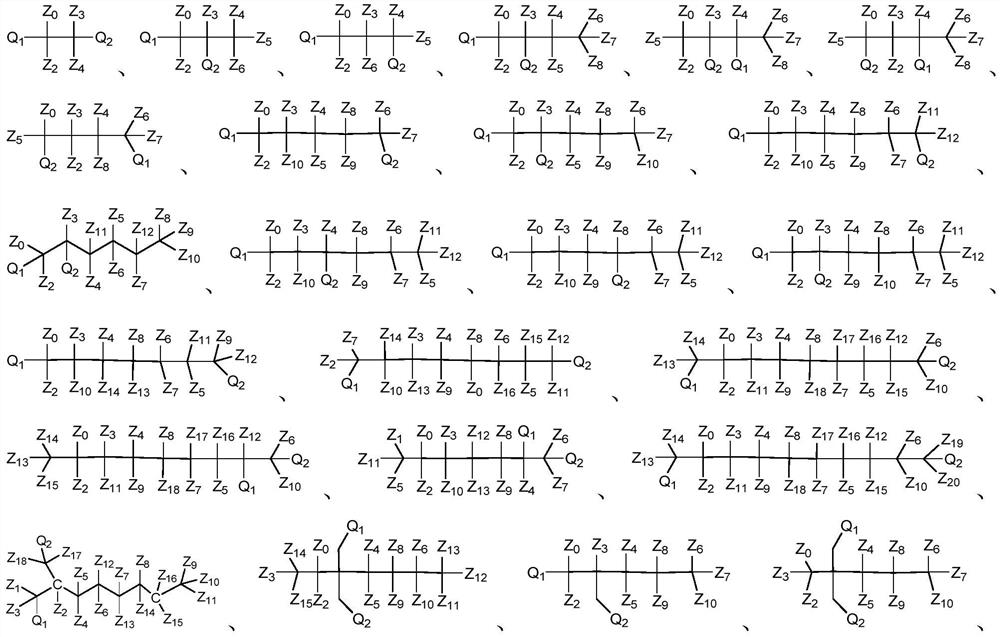Sulfur-based saturated carbon chain electrolyte as well as preparation method and application thereof
An electrolyte and liquid electrolyte technology, applied in organic electrolytes, non-aqueous electrolytes, circuits, etc., can solve problems such as uncertainty in correlation or inference, and achieve improved electrochemical performance, excellent electrochemical performance, and broadened electrochemical performance. window effect
- Summary
- Abstract
- Description
- Claims
- Application Information
AI Technical Summary
Problems solved by technology
Method used
Image
Examples
Embodiment 1
[0051] Example 1: Raw materials M1
[0052] Preparation method: under nitrogen atmosphere, mix 0.01 mol of raw material and boron trifluoride tetrahydrofuran complex (2.8 g, 0.02 mol) in 15 ml of ethylene glycol dimethyl ether, and react at room temperature for 12 hours. The obtained mixed solution was dried under reduced pressure at 45° C. and the vacuum degree was about -0.1 MPa to remove the solvent to obtain an intermediate. Lithium ethoxide (1.04g, 0.02mol) was dissolved in 10ml of ethanol and slowly added to the intermediate, the reaction was stirred at 45°C for 16 hours, and the resulting mixed solution was dried under reduced pressure at 45°C and a vacuum of about -0.1MPa. , the obtained solid was washed three times with n-butyl ether, filtered and dried to obtain product M1, and Q was -S-BF 3 Li. The yield was 85%, NMR as figure 1 shown.
Embodiment 2
[0053] Example 2: Raw materials M2
[0054] Preparation method: under argon atmosphere, metal lithium sheet (0.14 g, 0.02 mol) was slowly added to 0.01 mol of raw material, reacted at room temperature for 2 hours, and then heated to 50° C. until the lithium sheet reacted completely to obtain an intermediate. Boron trifluoride butyl ether complex (3.96g, 0.02mol) and 15ml THF (tetrahydrofuran) were added to the intermediate, and the reaction was stirred at 50°C for 12 hours. Drying under reduced pressure under the same conditions, the obtained solid was washed three times with isopropyl ether, filtered and dried to obtain product M2, Q is -S-BF 3 Li. The yield was 84%, NMR as figure 2 shown.
Embodiment 3
[0055] Example 3: Raw materials M3
[0056] Preparation method: under argon atmosphere, mix 0.01 mol of raw material and boron trifluoride diethyl ether complex (2.98 g, 0.021 mol) in 15 ml of ethylene glycol dimethyl ether, and react at room temperature for 12 hours. The obtained mixed solution was dried under reduced pressure under the conditions of 50° C. and a vacuum degree of about -0.1 MPa to remove the solvent to obtain an intermediate. 14ml of butyllithium in hexane solution (c=1.6mol / L) was added to the intermediate, and the reaction was stirred at room temperature for 10 hours. The resulting mixed solution was dried under reduced pressure at 40°C and a vacuum of about -0.1MPa. The obtained crude product was washed 3 times with cyclohexane, filtered and dried to obtain the product M3, and Q was -S-BF 3 Li. The yield was 82%, NMR as image 3 shown.
PUM
| Property | Measurement | Unit |
|---|---|---|
| Diameter | aaaaa | aaaaa |
| Diameter | aaaaa | aaaaa |
| Diameter | aaaaa | aaaaa |
Abstract
Description
Claims
Application Information
 Login to View More
Login to View More - R&D
- Intellectual Property
- Life Sciences
- Materials
- Tech Scout
- Unparalleled Data Quality
- Higher Quality Content
- 60% Fewer Hallucinations
Browse by: Latest US Patents, China's latest patents, Technical Efficacy Thesaurus, Application Domain, Technology Topic, Popular Technical Reports.
© 2025 PatSnap. All rights reserved.Legal|Privacy policy|Modern Slavery Act Transparency Statement|Sitemap|About US| Contact US: help@patsnap.com



